(完整版)导学案:人教版高中英语必修二Unit5Music学案
Book 2 Unit 5 Music 大单元教学设计 人教版必修第二册单元整体教学设计
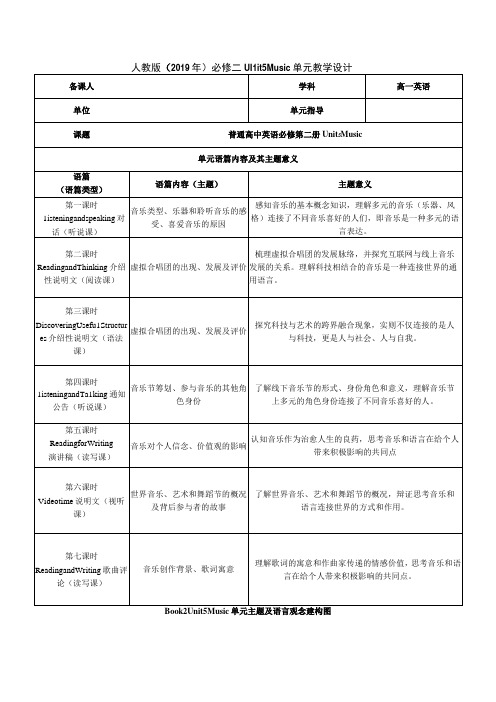
Book2UnitSMusic单元主■及遢直观念I1构就
单元目标
1.了解中外常见的不同类型的音乐特点和表现形式,在日常交际中得体恰当地表达关于音乐的偏好和喜爱。
2.阅读介绍虚拟合唱团及其创始人的说明性文本,理解和体会音乐在日常生活和社会发展过程中的积极作用。
并对
虚拟合唱团的评价,评价其价值和意义。
3.阅读和体会公众演讲文本所传递的信息和情感,分析和把握其语言特征和手修辞手法,写一篇关于音乐积极作用
的演讲短文。
通过本节课学习,学生能够:
1预测通知类听力文本内容,从而根据要求筛选获取重要信息。
2说出通知类听力文本的语言特点和结构特点。
3能够根据文中对话所呈现的这场音乐会通知的关键信息制作一份音乐会口头通知。
备课人李培睿学科高一英语
备课人李燕玲学科。
高中英语人教版必修2Unit 5 Music教学设计
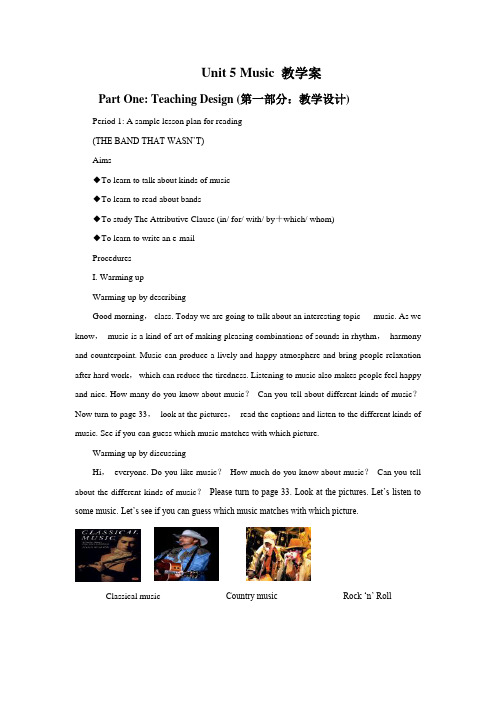
Unit 5 Music 教学案Part One: Teaching Design (第一部分:教学设计)Period 1: A sample lesson plan for reading(THE BAND THAT WASN’T)Aims◆To learn to talk about kinds of music◆To learn to read about bands◆To study The Attributive Clause (in/ for/ with/ by+which/ whom)◆To learn to write an e-mailProceduresI. Warming upWarming up by describingGood morning,class. Today we are going to talk about an interesting topic --- music. As we know,music is a kind of art of making pleasing combinations of sounds in rhythm,harmony and counterpoint. Music can produce a lively and happy atmosphere and bring people relaxation after hard work,which can reduce the tiredness. Listening to music also makes people feel happy and nice. How many do you know about music?Can you tell about different kinds of music?Now turn to page 33,look at the pictures,read the captions and listen to the different kinds of music. See if you can guess which music matches with which picture.Warming up by discussingHi,everyone. Do you like music?How much do you know about music?Can you tell about the different kinds of music?Please turn to page 33. Look at the pictures. Let’s listen to some music. Let’s see if you can guess which music matches with which picture.Classical music Country music Rock ‘n’ RollRap Orchestra Folk music 、Yes,you are right. I’m sure you will really enjoy yourselves after listening to all these beautiful music. What kind of music do you like better,Chinese or Western,classical or modern?Why?How does music make you feel?Why do you like to listen to music?Let’s discuss these questions in small groups. Try to share your opinions with one another.II. Pre-reading1.Thinking and sayingHave you heard about any of the famous bands in the world?List some if you can.For referen ce: I’ve heard about “The Beatles”,“Back Street Boys”,“The Eagles”,“West life” and “Pink Floyd”.2.Listening,talking and sharingLet’s listen to some pieces of music from different bands. Work in groups of four. Tell your group mates which band you like best. Why?Then the group leader is to stand up and share the group idea with the class.For reference: I am from Group 1. Our group likes “The Beatles” best. We like their style of performances. Listening to their performances,we will feel relaxed,amused,and their performances make us think a lot about life.Do you know anything about “The Monkees”?For referenc e: “The Monkees” is a band that was first popular in the 1960s in America.Unlike most bands of the time,the Monkees were not formed by its members but rather by TV producers. They were a fictional band in the TV show of the same name. The band was composed of Mike Nesmith,Mickey Dolenz,Davy Jones,and Peter Tork. All themembers had some musical experience. Let’s come to the reading --- The Band That Wasn’t and find more about them.III. Reading1.Reading aloud to the recordingNow please listen a nd read aloud to the recording of the text THE BAND THAT WASN’T. Pay attention to the pronunciation of each word and the pauses within each sentence. I will play the tape twice and you shall read aloud twice,too.2.Reading and underliningNext you are to read and underline all the useful expressions or collocations in the passage. Copy them to your notebook after class as homework.Collocations from THE BAND THAT WASN’Tdream of doing ,at a concert ,with sb. clapping and enjoying …,sing karaoke ,be honest with oneself,get to form a band,high school students,practice one’s music,play to passers-by,in the subway,earn some extra money,begin as a TV show,play jokes on…,be based loosely on…,the TV organizers,make good music,put an advertisement in a newspaper,look for rock musicians,pretend to do sth.,the attractive performances,be copied by…,support them fiercely,become more serious about…,play their own instruments,produce one’s own records,start touring,break up,in the mid-1980s,a celebration of one’s time as a real band3.Reading to identify the topic sentence of each paragraphSkim the text and identify the topic sentence of each paragraph. You may find it either at the beginning,the middle or the end of the paragraph.1st paragraph: How do people get to form a band?2nd paragraph: Most musicians meet and form a band.3rd paragraph: One band started as a TV show.4th paragraph: “The Monkees” became even more popular than “The Beatles”.3.Reading and transferring informationRead the text again to complete the tables,which list how people formed a band and how The Monkees was formed by the TV organizers and became a real band.How do people get to form a band ? MembersHigh school studentsReasonsThey like to write and play music. PlacesThey practice their music in someone’s home. FormsThey may play to passers-by in the street or subway. Results They can earn some extra money. They may also have a chance todream of becoming famous.How was The Monkees formed and became a real band ?The Monkees in 1968 (left to right): Micky Dolenz ,Peter Tork , Mike Nesmith & Davy Jonesbeginningof thebandIt began as a TV show. styleof the performanceThey played jokes on each other as well as played music. firstmusic and jokesMost of them were based loosely on the band called “The Beatles”. development of theband They became more serious about their work and started to play their own instruments and write their own songs like a realband. They produced their own records and started touring andplaying their own music.changes of the band The band broke up in about 1970, but reunited in themid-1980s. They produced a new record in 1996, which was acelebration of their time as a real band.4. Reading and understanding difficult sentencesAs you have read the text times,you can surely tell which sentences are difficult to understand. Now put your questions concerning the difficult points to me.IV. Closing downClosing down by doing exercisesTo end the lesson you are to do the comprehending exercises No. 1,2,3 and 4.Closing down by having a discussionDo you think the TV organizer s were right to call “The Monkees” a band when they did not sing or write their own songs?Why?For reference: I don’t think the TV organizers were right to call “The Monkees” a band when they did not sing or write their own songs because singing and writing its own songs was the basis of a band.Do you agree that the jokes were more important than the music for this band?Give a reason.For reference: Yes. I think it is the jokes that really attract more fans.No. I think the purpose of forming a band is getting people to enjoy the spirit of music.It’s more important than playing jokes just to make people laugh.Closing down by retelling the form of the band The Monkees.I shall write some key words and expressions on the board. You are to retell the form of the band according to these words.For reference: begin as a TV show,the TV organizers,look for,put an advertisement in a newspaper,use actors for the other members of the band,pretend to singPeriod 2: A sample lesson plan for Learning about Language(The Attributive Clause (in/ for/ with/ by+which/ whom).AimsTo help students learn about the Attributive Clause with a preposition in front.To help students discover and learn to use some useful words and expressions.To help students discover and learn to use some useful structures.ProceduresI. Warming upWarming up by discovering useful words and expressionsTurn to page 35 and do exercises No. 1,2 and 3 first. Check your answers against your classmates’.II. Learning about grammar1.Reading and thinkingTurn to page 34 and r ead with me the text of THE BAND THAT WASN’t. As you read on,pay attention to The Attributive Clause (in/ for/ with/ by+which/ whom),that is,the attributive clauses with a preposition ahead of the relative pronoun shown in the sentences.For reference: The musicians of whom the band was formed played jokes on each other as well as played music. However,after a year or so in which they became more serious about their work,“The Monkees” started to play their own ins truments and write their own songs like a real band.2.Doing exercises No. 1 and 2 on page 35Turn to page 34. Look at the two sentences:The musicians of whom the band was formed played jokes on each other as well as played music.However,after a year or so in which they became more serious about their work,“The Monkees” started to play their own instruments and write their own songs like a real band.Pay attention to the structure: preposition + relative pronoun. Usually only two relative pronouns --- which and whom--- can be used in the Attributive Clause,with a preposition put before the clause. That can’t be used. Look at the screen. Here are more examples on this kind of structure.1.This is the reason for which he left his hometown. (=why)2.I’ll never forget the day on which we stayed together. (=when)3.This is the girl from whom I learned the news.4.The person to whom I spoke just now is the manager that I told you about.5.I’ll show y ou a store in which you may buy all that you need.(=where)6.I don’t like the way in which you laughed at her.(=that)Now go on to do Exercise No. 2 on page 36,that is,to sort out the sentences.III. Ready used materials for The Attributive Clause (in/ for/ with/ by+which/ whom)In formal styles we often put a preposition before the relative pronouns which and whom: ∙The rate at which a material heats up depends on its chemical composition.∙In the novel by Peters,on which the film is based,the main character is a teenager.∙An actor with whom Gelson had previously worked contacted him about the role.∙Her many friends,among whom I like to be considered,gave her encouragement.Notice that after a preposition you can’t use who in place of whom,and you can’t use that or zero relative pronoun either:∙Is it right that politicians should make important decisions without consulting the public to whom they are accountable?(not --- the public to who they are accountable.) ∙The valley in which the town lies is heavily polluted. (not --- The valley in that the town...) ∙Arnold tried to gauge the speed at which they were traveling. (not --- the speed at they were traveling.)In informal English we usually put the preposition at the end in attributive clauses rather than at the beginning:∙The office which Graham led the way to was filled with books.∙Jim’s footballing ability,which he was noted for,had been encouraged by his parents.∙The playground wasn’t used by those children who it was built for.In this case we prefer who rather than whom (although whom is used in formal contexts). In restrictive attributive clauses we can also use that or zero relative pronoun instead of who or which (e.g. ...the children (that) it was built for).If the verb in attributive clauses is a two-or-three-word verb (e.g. come across,fill in,go through,look after,look up to,put up with,take on) we don’t usually put the preposition at the beginning:∙Your essay is on e of those (which/that) I’ll go through tomorrow. (rather than...throughwhich I’ll go tomorrow.)∙She is one of the few people (who/that) I look up to. (not ... to whom I look up.)In formal written English,we often prefer to use of which rather than whose to talk about things:∙A huge amount of oil was spilled,the effects of which are still being felt. (or...whose effects are still being felt.)∙The end of the war,the anniversary of which is on the 16th of November,will be commemorated in cities throughout the country. (or...whose anniversary is on...) Note that we c an’t u se of which in place of whose in the patterns described in Unit 71B:∙Dorothy was able to switch between German,Polish and Russian,all of which she spoke fluently. (not..,all whose she spoke...)We can sometimes use that...of in place of of which. This is less formal than of which and whose,and is mainly used in spoken English:∙The school that she is head of is closing down. (or The school of which she is head...)Whose can come after a preposition in attributive clauses. However,it is more natural to put the preposition at the end in less formal contexts and in spoken English:∙We were grateful to Mr. Marks,in whose car we had traveled home. (or...whose car we had traveled home in.)∙I now turn to Freud,from whose work the following quotation is taken. (or...whose work the following quotation is taken from.)IV. Closing down by doing exercises:Join the sentence halves using which or whom after an appropriate preposition. (A)a. I would never have finished the work.b. It was primarily written.c. We know nothing.d. They got a good view.e. He learned how to play chess.f. Dennis scored three goals in the final.g. She was born.h. It was discovered.1.They climbed up to the top of a large rock.2. I would like to thank my tutor.3. She has now moved back to the house on Long Island.4. The star is to be named after Patrick Jenks.S. This is the ball.6. He is now able to beat his father.7. The book is enjoyed by adults as well as children.8. There are still many things in our solar system.Key for reference:1.They climbed up to the top of a large rock,from which they got a good view.2. I would like to thank my tutor,without whom I would never have finished the work.3. She has now moved back to the house on Long Island,in which she was born.4. The star is to be named after Patrick Jenks,by whom it was discovered.S. This is the ball. Dennis scored three goals in the final.6. He is now able to beat his father,from whom he learned how to play chess.7. The book is enjoyed by adults as well as children,about whom it was primarilywritten.8. There are still many things in our solar system,about which we know nothing.Are these correct or appropriate?If they are,put a√. If they are not,give a reason,correct them and give alternatives if you can. (A)I. It's a piece of jewelry across which I came in an antique shop. --- which I came across in an antique shop. (‘came across’ is a two-word verb.)2. The extra work which she took on was starting to affect her health.3. My mother,after whom I looked for over 20 years,died last year.4. The people whom I work with are all very friendly.5. Some of the criticisms with which they had to put up were very unfair.6. He had many friends with whom he had a regular correspondence.7. The woman to who he is engaged comes from Poland.8. The forms which I had to fill in were very complicated.Rewrite these sentences so that they are more appropriate for formal written English. Usepreposition + which or preposition + whose,as appropriate. (B)I. Tom Sims,whose car the weapons were found in,has been arrested. Torn Sims,in whose car the weapons were found,has been arrested.2. Tom Ham,whose novel the TV series is based on,will appear in the first episode.3. Dr Jackson owns the castle whose grounds the main road passes through.4. Tessa Parsons is now managing director of Simons,the company that she was once a secretary in.5. Allowing the weapons to be sold is an action that the Government should be ashamed of.6. The dragonfly is an insect that we know very little of.Period 3: A sample lesson plan for Using LanguageAimsTo read the s tory about Freddy and then enjoy and understand Beatles’ songs.To use the language by reading,listening,speaking and writing.ProceduresI. Warming up by listening and writingTurn to page 37 and read these sentences before listening to the tape. Then listen to the tape and decide true or false.II. Guided reading1. Reading and translatingRead more about F reddy’s life and translate it into Chinese paragraph by paragraph.2. Reading and underliningNext you are to read and underline all the useful expressions or collocations in the passage. Copy them to your notebook after class as homework.Collocations from Freddy’s lifebecome famous,visit Britain on a tour,wait for hours to get tickets for the concerts,be confident,enjoy singing and all the congratulations,the most exciting experience,sing in a TV program called “Top of the Pops,wear an expensive suit,give a performance to a TV camera,go wrong,not go out without being followed everywhere,wear sunglasses,hide in railway stations,one’s personal life,become too painful for sb.,pack one’ s bags3. Doing exercisesNow you are going to do exercises No. 3,4 and 5 on page 38 following the article.Ex3: Here are the incorrect sentences which should be crossed out.1. Freddy and his band always loved being pop stars.2. His favorite program was “Top of the Pops”.3. Things went wrong because Freddy and his band hid themselves.4. They realized they had to go because they were painful.Exercise 4 Answer these questions:1. This is an open question by which students are asked about their opinions.Answers may vary.2. Answers may vary but there is information in the reading passage that may include:--- becoming rich;--- doing a job you want to do;--- having many fans;--- people enjoying your music.3. Answers may vary but information may include:--- peaceful and quiet;--- a private life away from crowds;--- a personal life which others do not discuss.Exercise 5: The main idea is No. 3. This is a story about a band that became famous and did not like it. Only No. 3 best summarizes the main idea,while all the others reflect just part of the main idea. At first,Freddy and his band wanted to be famous,but when he became famous,they were always being followed wherever they went,which they found painful.III. Guided writing1.Writing a letter for advicePlease turn to page 38 writing. Let’s read the instructions.You and your friends want to start your own band. However,you have never played ina band before. You write an e-mail to Freddy for his advice. The e-mail is started for you,but you have to finish it.You’d bett er do some brainstorming in small groups before writing your letters. You should follow the procedure for brainstorming and outlining introduced in Module 1 Unit 2.Writing tips:1. In groups discuss some questions you would like to ask Freddy.2. Make a list of them and choose the best questions.3. Share your ideas with another pair;discuss all questions and then decide whichones you want to ask Freddy.4. Use each question to start a new paragraph.5. Write your question first;then add extra information to show Freddy why youneed help.6. Finish the letter politely and thank Freddy for his help.2.Reading Freddy’s replyLet’s read Freddy’s reply and answer the questions:--- How was Freddy’s band formed?--- What advice does Freddy give?3.Writing a note and a paragraphPlease turn to page 74. Now in pairs you are going to decide on the best way to tell a foreign friend about one kind of Chinese folk music. What do you think they need to know before they can enjoy it?Why do you like it?Who are your favorite singers?Discuss it with your partner and write notes to remind you of your most important ideas. Then write a paragraph telling your foreign friend about the type of Chinese folk music you have chosen. Use a dictionary and other reference books to help you.IV. Further applyingFinding informationGo to the library to read or get online to search in order to find more information on music and musicians. Take notes of your findings and report them to your group mates next Monday morning.V. Closing down by filling a formMake use of the text and others to fill in the form below.How do people form a bandMembersReasonsPlacesFormsResultsClosing down by describing a bandTo end this period,I am going to have two of you to describe to the class a band whom you appreciates. Who’d like to speak first?Part Two: Teaching Resources (第二部分:教学资源)Section 1: A text structure analysis of THE BAND THAT WASN’TI. Type of writing and summary of the ideaType of writing This is a piece of narrative writing.Main idea of the passage The band The Monkees was formed in quite adifferent way. It started as a TV show,with musiciansplayed jokes on each other as well as played music,based loosely on the band called The Beatles. As timewent on,their attractive performances gained fiercelysupport from their fans. With their own particular style ofperforming their band at last became very popular in theUSA.Topic sentence of 1st paragraphHave you ever wanted to be a famous singer or musician?Topic sentence of 2nd paragraphMost musicians meet and form a band because they like to play music.Topic sentence of 3rd paragraphHowever,there was one band that started in a different way.Top sentence of 4th paragraphTheir attractive performances were copied by other groups and their fans supported them fiercely.II. A tree diagramIII. A retold passage of the text1. A possible version:Being a famous singer or musician may be the dream of many people. Becoming a member of a band may help you realize the dream. But just how can people form a band ?Most musicians often meet and form a band for they are congenial with each other. High school students may also form a band to practice music together or sometimes play in the street to passers-by to earn some extra money , which is also a chance to realize their dreams of becoming famous.However , There was a band which was started in quite a different way. The musicians of whom the band was formed played jokes on each other and played music , loosely based on the Beatles. Their exciting performances were copied by other groups and were fiercely supported by their fans. That band was The Monkees. After a year or so , The Monkees became more serious of their work , playing their own instruments and writing their own music. Though it broke up in 1970, it reunited in the mid-1980s and is still popular today.Section 2: Background information on music , musicians and the band The MonkeesI. Different types of music:Folk music Dreaming of being a famous musician or singer.How musicians form bands. How The Monkees got their start. How The Monkees became serious about the music business.It has been passed down from one generation to another. At first it was never written down. People learned the songs from their families,relatives,neighbors and friends in the same village. These songs were about the country life,the seasons,animals and plants,and about love and sadness in people’s lives.Pop musicIt is a kind of modern music with a strong beat and not of lasting interest,especially just favored for a short time by younger people•Rock ’n’ RollIt is also called rock and roll,a kind of modern music with strong beat,played loudly on electrical instruments,in which the singer repeats the same few simple words.JazzJazz was born in the USA around 1890. It came from work songs sung by black people and had its roots in Africa. Jazz started developing in the 1920s in the southern states. Soon it was played by white musicians,too,and reached other parts of the USA.African musicIt plays an impor tant part in people’s lives,especially for work,and at festivals and weddings,when people dance all night long.Indian musicIt’s not written down. There is a basic pattern of notes which the musician follows. But a lot of modern music is also written. India also produces films with music,and millions of records are sold every year.Music in the CaribbeanThe slaves who were brought from Africa developed their own kind of music. West Indians make musical instruments out of large oil cans. They hit different parts of the drum with hammers to produce different notes. This type of music has become very famous in Britain and is very good music to dance to.II. Famous musicians:Joseph Haydn(1732-1809)was an Austr ian composer and is known as “the father of the symphony”. Other composers had written symphonies before Haydn,but he changed the symphony into a long piece for a large orchestra.He was born in a village in Austria,the son of a peasant. He had a beautiful singing voice. After studying music in Vienna,Haydn went to work at the court of a prince in eastern Austria,where he became director of music. Having worked there for 30 years,Haydn moved to London,where he was very successful.Wolfgang Amadeus Mozart (1756-1791)was a composer,possibly the greatest musical genius of all time. He only lived 35 years and he composed more than 600 pieces of music.Mozart was born in Salzburg,Austria. His father Leopold was a musician and orchestra conductor. Wolfgang had musical talent from a very early age. He learned to play the harpsichord in a concert for the Empress of Austria.By the time he was 14,Mozart had composed many pieces for the harpsichord,piano and violin,as well as for orchestras. While he was still a teenager,Mozart was already a big star and toured Europe giving concerts. Haydn met Mozart in 1781 and was very impressed with him. “He is the greatest composer the world has known,” he said. The two were friends until Mozart’s death in 1791.Ludwig van Beethoven (1770-1827)was born in Bonn,Germany. He showed musical talent when he was very young,and learned to play the violin and piano from his father,who was a singer. Mozart met Beethoven and was impressed by him. “He will give something wonde rful to the world,” he said. Beethoven met Haydn in 1791,but was not impressed by the older man. After they had known each other for many years,Beethoven said,“He is a good composer,but he has taught me nothing.” However,it was Haydn who encouraged Beethoven to move to Vienna. Beethoven became very popular in the Austrian capital and stayed there for the rest of his life. As he grew older,he began to go deaf. He became completely deaf during the last years of his life,but he continued composing.III. Musical instrument 乐器saxophone electrical equipment pianoguitar fluteV. What are the functions of music ?•Make things more lively and interesting•Make things better for pe ople to understand and enjoy•Express people’s feeling•Make people feel good•Help people forget their pain•Attract people’s attention•help people to remember things wellVI. The introduction of the band The MonkeesThe Monkees were a four-person band who appeared in an American television series of the same name , which ran on NBC from 1966 to 1968. The Monkees were formed in 1965 in LosAngeles,California and disbanded in 1970. At their peak they were one of the most popular musical acts of their time.Several reunions of the original lineup have taken place. The first reunion lasted from 1986 to 1989,and a second regrouping took place between 1996-1997. The Monkees last worked together for a brief period in 2001.Section 3: Words and expressions from Unit 5 THE BAND THAT WASN’TI. Words for Readingclassicaladj. (of music)put together and arranged(composed) with serious artistic intentions;having an attraction that lasts over a long period of time(as opposed to popular or folk music)(音乐)古典的Bach and Beethoven wrote classical music. the classical music of India/ the classical symphonyrollvt.&vi. 1. to (cause to) move along by turning over and over(使)滚动We rolled the barrels of oil onto the ship. Tears were rolling down her cheeks. 2. to move steadily and smoothly along(as) on wheels(车轮)滚动;转动The train rolled slowly into the station. The waves rolled over the sand. 3. (of a ship)to swing from side to side with the movement of the waves摇摆;摇晃The ship rolled so heavily that we were all sick.4. keep the ball rolling: to keep things active and moving(使事情,工作等)继续进行下去;不松懈5. set the ball rolling: to be the first to do something,hoping that others will follow带动;带头(希望他人跟随)I’ll sing a song first,just to set the ball rolling.folkadj. of,connected with,or being music or any other art that has grown up among working and/or country people as an important part of their way of living and belongs to a particular area,trade,etc.,or that has been made in modern times as a copy of this(音乐;艺术)民间的;民俗的folk music/ folk songs/ Chinese folk art/ give a folk concert/a folk singerjazz n.爵士音乐traditional jazz/ modern jazz/ jazz music/ a jazz bandmusician n.音乐家a fine musiciandreamn. 1. a group of thoughts,images,or feelings experienced during sleep梦2. sth. imaged,。
Unit5Music语言点导学案-高中英语人教版
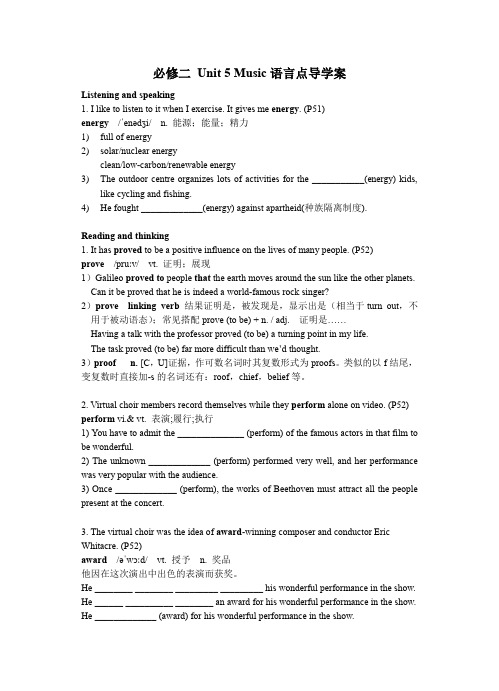
必修二Unit 5 Music语言点导学案Listening and speaking1. I like to listen to it when I exercise. It gives me energy. (P51)energy/ˈenədʒi/ n. 能源;能量;精力1)full of energy2)solar/nuclear energyclean/low-carbon/renewable energy3)The outdoor centre organizes lots of activities for the ___________(energy) kids,like cycling and fishing.4)He fought _____________(energy) against apartheid(种族隔离制度).Reading and thinking1. It has proved to be a positive influence on the lives of many people. (P52)prove/pruːv/ vt. 证明;展现1)Galileo proved to people that the earth moves around the sun like the other planets. Can it be proved that he is indeed a world-famous rock singer?2)prove linking verb结果证明是,被发现是,显示出是(相当于turn out,不用于被动语态);常见搭配prove (to be) + n. / adj. 证明是……Having a talk with the professor proved (to be) a turning point in my life.The task proved (to be) far more difficult than we’d thought.3)proof n. [C,U]证据,作可数名词时其复数形式为proofs。
人教版高中英语必修2 Unit 5 Music 教案

Unit 5 Music I. 单元教学目标II. 目标语言Ⅲ. 教材分析与教材重组1. 教材分析本单元以music为话题,通过对本单元的教学,使学生了解有关的音乐知识,了解乐队The Monkees的形成,表演风格及发展历程,让学生在理解文章,理解音乐的同时,潜移默化培养一种审美的情趣,也会对社会生活,人的思想观,价值观以及人应该追求什么进行思考。
并通过学习一个有趣的寓言故事,侧面了解演员成名后,歌迷给其带来的苦恼;暗示过分痴迷所带来的负面影响。
同时让学生利用目标语言学会表达自己的观点,征询建议及把握介词提前的定语从句的使用;能利用本单元所学知识写e-mail 或短文介绍中国有关的民间音乐。
1.1 Warming up 是听八段不同的音乐,然后与书上的八幅图片相搭配,目的是通过听不同的音乐,让他们了解有关类型的音乐,讨论对于音乐的感受和喜欢听音乐的原因,激发他们对此话的兴趣,带他们进入话题。
1.2 Pre-Reading 提出三个问题,引导学生谈论有名的乐队,尤其是与课文相关的门基合唱组。
在学课文前扩展学生的思维,为学课文做好准备。
1.3 Reading 课文以知名乐队The Monkees的成立和发展为切入点,从通俗音乐的题材,特点,内容以及半个世纪来的发展历程等多个方面介绍了这种音乐艺术形式,并以音乐作为一个侧面反映了近几十年来美国社会和价值观的变化,是一篇涵盖了大量的信息量,同时又可以给学生艺术和思想双重启迪的优美文章。
通俗音乐发展历史悠久,六十年代开始成为美国社会流行音乐主流,节奏强烈,主题鲜明,歌词率真,容易引发人的共鸣,尤其是在喜爱音乐的年轻人中可以产生感官和心灵上的触动。
同时,流行音乐歌曲所负载的是整个社会所接受和追求的一种价值观。
学习这篇课文,学生在理解文章,理解音乐的同时,潜移默化中也在培养一种审美的情趣,也会对社会生活,人的思想观,价值观以及人应该追求什么进行一定的思考。
因此,作为一篇谈论音乐的文章,它提供了较广泛的教学资源拓展空间,它可以博得学生的喜爱,可以使学生有较大的热情积极投入到课堂教学中来,和教师在探究中共同学习。
高中英语人教版(2019)必修二 Unit5 Music Language-points教案
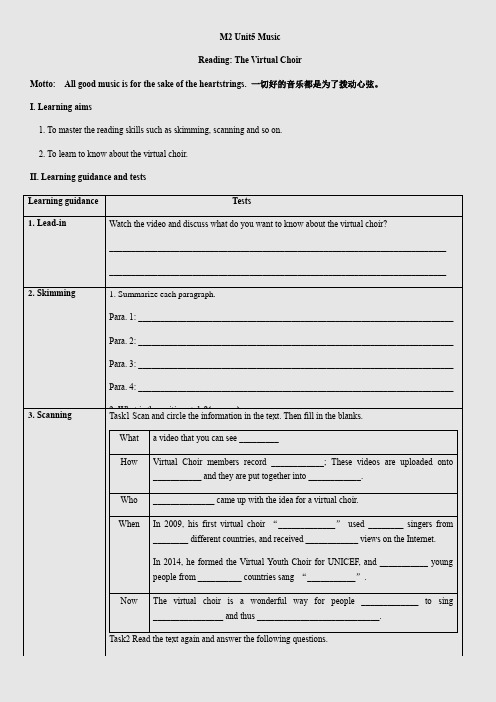
M2 Unit5 MusicReading: The Virtual ChoirMotto: All good music is for the sake of the heartstrings. 一切好的音乐都是为了拨动心弦。
I. Learning aims1. To master the reading skills such as skimming, scanning and so on.2. To learn to know about the virtual choir.II. Learning guidance and testsLearning guidance Tests1.Lead-in Watch the video and discuss what do you want to know about the virtual choir?__________________________________________________________________________________________________________________________________________________________ 2.Skimming 1. Summarize each paragraph.Para. 1: ________________________________________________________________________Para. 2: ________________________________________________________________________Para. 3: ________________________________________________________________________Para. 4: ________________________________________________________________________2. What is the writing style?( )3.Scanning Task1 Scan and circle the information in the text. Then fill in the blanks.What a video that you can see _________How Virtual Choir members record ____________; These videos are uploaded onto___________ and they are put together into ____________.Who______________ came up with the idea for a virtual choir.When In 2009, his first virtual choir “_____________”used ________ singers from________ different countries, and received ____________ views on the Internet.In 2014, he formed the Virtual Youth Choir for UNICEF, and ___________ youngpeople from __________ countries sang “___________”.Now The virtual choir is a wonderful way for people _____________ to sing________________ and thus ____________________________.Task2 Read the text again and answer the following questions.1. What are the advantages and disadvantages of being a member of a virtual choir?_____________________________________________________________________________________________________________________________________________________________________________________________________________________________________________2. For virtual choir members, what was it like for them in experiences of singing?_____________________________________________________________________________________________________________________________________________________________________________________________________________________________________________ 4.Discussion Does a virtual choir really bring people together? Why or why not?______________________________________________________________________________________________________________________________________________________________ 5.Summary Summary —Music without borders, we are the world.Music brings us together, connects us with other people, and allows us to express ourselves inways that are different from speech and writing. It has the ability to convey emotions and messagesto the core of people.III ConsolidationLevel A: Using the key words or phrases in the text as possible as you can to retell the text.have the opportunity to virtual choir take part in enable sb. to do sth. prove awardgraduate from original inspired performance stage voiceLevel B: About music.Music is the important part of my life.The world needs music to amuse people's life.As they live in the fast pace, music can bring them the great joy and relax.Since I was very small, I fell in love with music and every time when I heard music, my body would move and feel relaxed.The function of music is various.There is a famous song, which is called Let the music heal your soul.A lot of young people have their favorite singers.When they see their idols face to face, they would say thank you to the singers, because their songs inspire these young people to move on in the dark days.The songs deliver positive messages to the public and inspire them to never give up.Listening to the music is the main way for the young people to release their pressure.Every day before I sleep, I will listen to the light music, which helps me to take relax and make me sleep well.The reason why so many people like to go to KTV after their work lies in releasing pressure.They need to shout and then forget about the annoyance.音乐是我生命中重要的一部分。
Unit5Music知识点学案-高中英语人教版
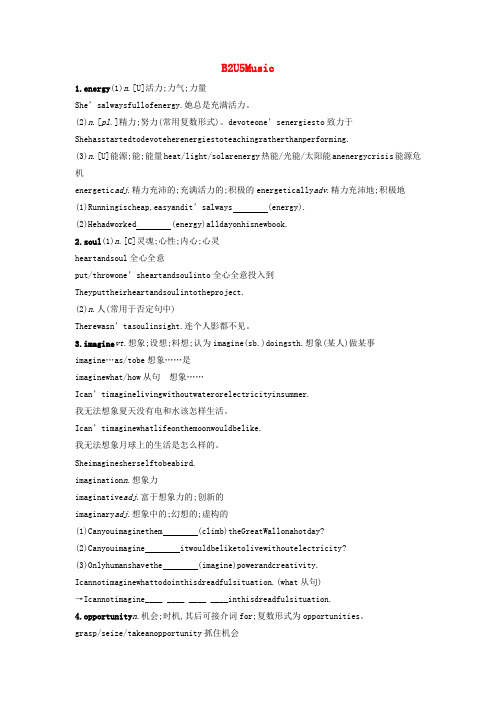
B2U5Music1.energy(1)n.[U]活力;力气;力量She’salwaysfullofenergy.她总是充满活力。
(2)n.[pl.]精力;努力(常用复数形式)。
devoteone’senergiesto致力于Shehasstartedtodevoteherenergiestoteachingratherthanperforming.(3)n.[U]能源;能;能量heat/light/solarenergy热能/光能/太阳能anenergycrisis能源危机energetic adj.精力充沛的;充满活力的;积极的energetically adv.精力充沛地;积极地(1)Runningischeap,easyandit’salways(energy).(2)Hehadworked (energy)alldayonhisnewbook.2.soul(1)n.[C]灵魂;心性;内心;心灵heartandsoul全心全意put/throwone’sheartandsoulinto全心全意投入到Theyputtheirheartandsoulintotheproject.(2)n.人(常用于否定句中)Therewasn’tasoulinsight.连个人影都不见。
3.imagine vt.想象;设想;料想;认为imagine(sb.)doingsth.想象(某人)做某事imagine…as/tobe想象……是imaginewhat/how从句想象……Ican’timaginelivingwithoutwaterorelectricityinsummer.我无法想象夏天没有电和水该怎样生活。
Ican’timaginewhatl ifeonthemoonwouldbelike.我无法想象月球上的生活是怎么样的。
Sheimaginesherselftobeabird.imagination n.想象力imaginative adj.富于想象力的;创新的imaginary adj.想象中的;幻想的;虚构的(1)Canyouimaginethem (climb)theGreatWallonahotday?(2)Canyouimagine itwouldbeliketolivewithoutelectricity?(3)Onlyhumanshavethe (imagine)powerandcreativity. Icannotimaginewhattodointhisdreadfulsituation.(what从句)→Icannotimagine____ ____ ____ ____inthisdreadfulsituation.4.opportunity n.机会;时机,其后可接介词for;复数形式为opportunities。
新人教版高中英语必修2Unit5 Music教案
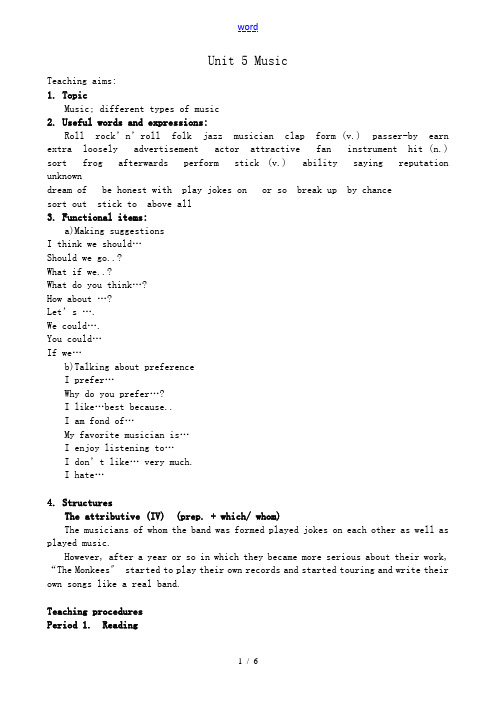
Unit 5 MusicTeaching aims:1. TopicMusic; different types of music2. Useful words and expressions:Roll rock’n’roll folk jazz musician clap form (v.) passer-by earn extra loosely advertisement actor attractive fan instrument hit (n.) sort frog afterwards perform stick (v.) ability saying reputation unknowndream of be honest with play jokes on or so break up by chancesort out stick to above all3. Functional items:a)Making suggestionsI think we should…Should we go..?What if we..?What do you think…?How about …?Let’s ….We could….You could…If we…b)Talking about preferenceI prefer…Why do you prefer…?I like…best because..I am fond of…My favorite musician is…I enjoy listening to…I don’t like… very much.I hate…4. StructuresThe attributive (IV) (prep. + which/ whom)The musicians of whom the band was formed played jokes on each other as well as played music.However, after a year or so in which they became more serious about their work, “The Monkees〞 started to play their own records and started touring and write their own songs like a real band.Teaching proceduresPeriod 1. ReadingStep 1. Warming up1. Ss listen to the different kinds of music on the tape and try to guess which music matches which pictures on page 33.2. Ss discuss and answer:1). What kind of music do you like better, Chinese or Western, classical or modern? Why?2). How does music make you feel?3). Why do you like to listen to music?Step 2. Pre-readingSs discuss the following questions with their partners and then ask them to report in class.1). Have you heard about any of the famous bands in the world? List some if you have.2). Which one do you like best? Why?3). Do you know anything about “ The Monkees〞?Step 3. Reading1. scanning: Ss read the passage quickly and try to answer the following questions:1). What are the benefits if students form a band to play in the street?2). When did “The Monkees〞 break up and when did it reunite?3). Why was “ The Monkees〞 successful in their work?2. Ss read the passage again and finish Ex 1 and 2 in prehending.3. Ss try to get the main idea of each paragraph.Suggested answers:Para. 1 dreaming of being a famous musician or singerPara. 2 how musicians form bandsPara. 3 how The Monkees got their startPara. 4 how The Monkees became serious about the music businessStep 4. Langrage points1. dream of2. …with everyone clapping and enjoying…3. pretend4. play jokes5. base on6. …of whom the band was formed…7. break upStep 5. Retelling1. Show the key words and relevant pictures on the screen.2. Ask the Ss to retell the passage, according to the following key words.be honest with, dream of, form a band, earn extra money, give a chance;A band started in a different way, play jokes on, music and jokes, be based on, The Monkees, play instruments, write their own music, break up, reinite;Step 6. Assignment1. Please collect some information about your favourite music and some famous musicians.2. Read the text fluently and pick out the sentences you appreciate.Period 2. GrammarStep 1. RevisionCheck the homework.Step 2. Learning about language1. Discovering useful words and expressions.1). Ss do exercise 1 by themselves, and refer to the dictionaries if necessary. Then check the answers with the whole class.2). Ex.2. In this part, get the Ss to do this exercise individually. After that, ask them to discuss their answers in pairs and then with the whole class.3). Ex. 3. In this part, get the Ss to work in pairs and talk about their dreams and imagine what they expect to happen. Then ask them to report their work.2. Discovering useful structures1). Ex.1 First ask the Ss pay attention to the structure in the attributive clause. When the preposition is put before the relative clause, usually only two relative pronouns are used—which and whom. That is never used. Then Ss look at the screen and learn more about this kind of structure.a. In the strange city, he could not find anyone to whom turned for help.b. I’ll never forget the day on which we met for the first time.c. This is the professor from whom we can learn a lot.d. This is the gun with which the hunter shot the wolf.2). Ex. 2. Ss do it by themselves and then discuss the answers in pairs. At last, check the answers with the whole class.Step 3. Using words and phrases1. Ss do this exercise by themselves.2. Check the answers in pairs.3. Check the answers in class.Step 4. Using structures1. Ss do exercise 1 on page 71.2. Correcting: for this exercise, ask the Ss to do it by themselves and then check the answers with the whole class.3. Ex. 3. translating into English1). Ss write the sentences down.2). Ss report their work.Step 5. AssignmentReview the attributive clause.Period 3. ListeningStep 1. Listening1. Read and guess: Ss read the sentences on page 37 and guess what the story is about.2. Ss listen to the tape and tell the main idea.3. Ss listen to the tape again and decide which of the statements are true orfalse.4. Ss retell the story.Step 2. Listening (page69)1. Ss read the questions and guess what the listening material is about.2. Ss listen and make some notes of what they hear while listening. Play the tape twice.3. Check the answers with the whole class.Step 3. Listening (page 72)1. First listening: Ss listen and make some notes.2. Second listening: Ss listen and do the exercise.3. Third listening: Ss listen and check the answers.4. Ss talk about how they feel about music.Step 4. Assignment1. Ask the Ss to write a passage about their opinions about music.2. Summarize what they have learned in this unit.Period 4. Extensive readingStep 1. Pre-reading1. Ss say something about Freddy who wanted to be famous.2. Ss read the passage on page 37 quickly and answer the following questions:a. Did Freddy enjoy being famous?b. What’s the problem when he became famous?Step 2. Reading1. Ss read again carefully and do Ex.3.2. Ss go on with Ex. 5.3. Ss finish Ex.4.Step 3. Language points1. on a tour;2. give a performance;3. Freddy and his band could not go out without being followed.4. useless;5. cross out;6. afterwards;Step 4. Extensive reading (page 72)1. Ss guess what the ballad is mainly about.2. Ss read and find some rhyming words in each part.3. language points:a. The other day;b. …turned ten;c. be proud of;d. occur to: e into mind; take place4. Listening: Ss listen to the song and try to remember the ballad and sing the song.Step 5. AssignmentRead more about music.Period 5. SpeakingStep 1. Speaking (page 39)1. This part aims at getting the Ss to see their imagination. They can try forming their own bands. First let the Ss discuss their plans for organizing a band of their own in groups of 6. Ask them to discuss the following questions:a. What is the name of their band?b. What kind of band will it be?c. What English songs will they play?At last, ask some bands to perform the songs they have chosen.2. Language points:a. mean; mean to dob. …stay with what is true in your heart;c. e out;d. in one’s hearte. decide on /upon: make up one’s mindStep 2. Talking (page69)1. Ss in groups of 4 discuss with their members and then write a note for anyone who would like to join them.2. Show their notes in class.Step 3. Speaking task1. Discussion: Ss wok in pairs and discuss what music and musicians they like or dislike and give their reasons.2. Ss show their result of discussion.Step 4. Assignment1. Talk more about music and musicians with your classmates.2. Prepare for the lesson about writing.Period 6. WritingStep 1. pre-writing1. Ss read the instructions.2. Ss read Freddy’s reply and answer the questions:1). How was Freddy’s band formed?2). What advice does Fred give?Step 2. Writing1. Ss writing Freddy a letter to ask him for his advice.2. Writing tips:a. Think of some questions you would like to ask Freddy.b. Make a list of them.c. Use each question to start a new paragraph.d. Add some extra information to show Freddy why you need some help.e. Finish the letter politely and thank Freddy for his help.Step 3. Writing task ( page 74)1. Ss in groups of 4 discuss the best way to tell a foreign friend about one kind of Chinese folk music. Ss should make a list the points of their discussion. Ss try to answer the following questions while discussing:a. how to tell a foreigner about one kind of Chinese folk music?b. What do they need to know before they can enjoy it?c. Why do you like it?d. Who is your favorite singer?1. Ss write a paragraph telling their friends about the type of Chinese folk music they have chosen.Step 4. Assignment1. Go over the unit and finish summing up on page 40.2. Review the whole unit.。
高中英语必修二Unit5_Music教案
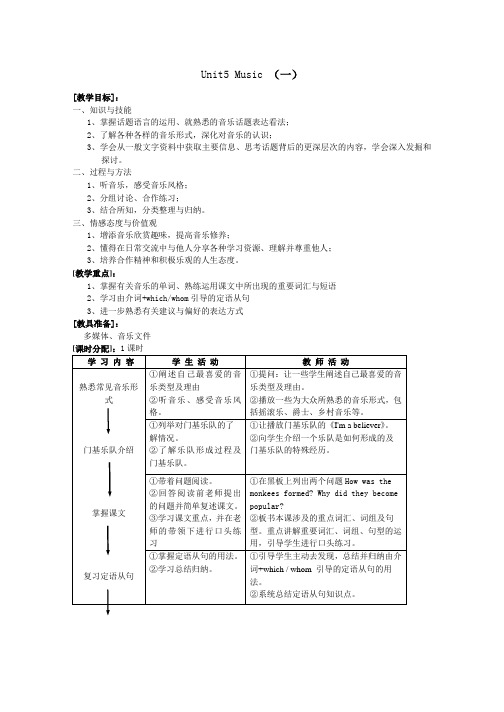
Unit5 Music (一)[教学目标]:一、知识与技能1、掌握话题语言的运用、就熟悉的音乐话题表达看法;2、了解各种各样的音乐形式,深化对音乐的认识;3、学会从一般文字资料中获取主要信息、思考话题背后的更深层次的内容,学会深入发掘和探讨。
二、过程与方法1、听音乐,感受音乐风格;2、分组讨论、合作练习;3、结合所知,分类整理与归纳。
三、情感态度与价值观1、增添音乐欣赏趣味,提高音乐修养;2、懂得在日常交流中与他人分享各种学习资源、理解并尊重他人;3、培养合作精神和积极乐观的人生态度。
[教学重点]:1、掌握有关音乐的单词、熟练运用课文中所出现的重要词汇与短语2、学习由介词+which/whom引导的定语从句3、进一步熟悉有关建议与偏好的表达方式[教具准备]:多媒体、音乐文件[引入新课]:提出问题;同学们最喜爱的音乐类型是什么?理由?[讲解词]:音乐是我们日常生活中表达喜悦、忧伤、幸福、忧愁等诸多情感的媒介,也是大家十分喜爱的艺术形式,要让大家说出自己喜爱的歌手或者音乐家我相信大家一定可以说出好多来。
今天我想和同学们探讨一下,大家平时喜爱的音乐类型,对这些音乐类型的了解和体会,我也很想听听同学们对这些音乐类型的看法,给大家讲讲为什么喜欢这种音乐类型?(选若干同学们回答)(适当总结学生所讲)同学们对所喜爱的音乐类型理由的阐述也是各有道理,所谓萝卜白菜各有所爱,每个人都有自己独特的个人喜好,对音乐类型的偏好也是如此。
也许某一天你们之中有人会成为音乐家,或者有人会成立乐队,给大家带来好听的音乐作品,丰富大家的精神生活。
[讲授新课]:一、介绍门基乐队[提出问题]:同学们有没有听过门基乐队?门基乐队有哪些作品?[学生讨论]:对门基乐队的了解。
门基乐队是一只美国本土乐队,由四人组成,于二十世纪60年代兴起,最初,乐队成员是应一则电视广告走到一起的。
主要作品有《Waiting For The Sun》、《The Unknown Soldier》、《The Soft Parade》、《Morrison Hotel》[运用教具]:播放门基乐队的《I'm a believer》给学生听,使他们亲耳感受门基乐队的风格特点。
人教新课标高中英语必修二Unit 5 Music导学案
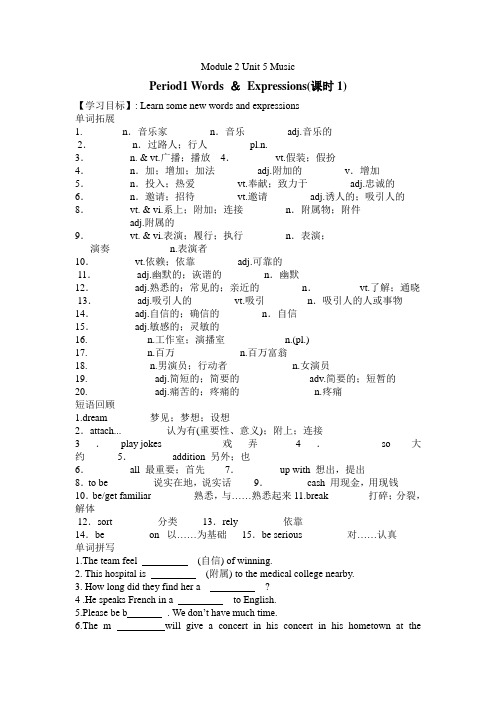
Module 2 Unit 5 MusicPeriod1 Words &Expressions(课时1)【学习目标】: Learn some new words and expressions单词拓展1.________n.音乐家 ________n.音乐 ________adj.音乐的2.________n.过路人;行人 ________pl.n.3.________n. & vt.广播;播放 4.________vt.假装;假扮4.________n.加;增加;加法 ________adj.附加的 ________v.增加5.________n.投入;热爱 ________vt.奉献;致力于 ________adj.忠诚的6.________n.邀请;招待 ________vt.邀请 ________adj.诱人的;吸引人的8.________vt. & vi.系上;附加;连接 ________n.附属物;附件________adj.附属的9.________vt. & vi.表演;履行;执行 ________n.表演;演奏 ___________ n.表演者10.________vt.依赖;依靠 ________adj.可靠的11.________adj.幽默的;诙谐的 ________n.幽默12.________adj.熟悉的;常见的;亲近的 ________n. ________vt.了解;通晓 13.________adj.吸引人的 ________vt.吸引 ________n.吸引人的人或事物14.________adj.自信的;确信的 ________n.自信15.________adj.敏感的;灵敏的16.____________n.工作室;演播室___________n.(pl.)17.____________n.百万_____________n.百万富翁18. ____________n.男演员;行动者____________n.女演员19._____________ adj.简短的;简要的____________adv.简要的;短暂的20._____________ adj.痛苦的;疼痛的______________n.疼痛短语回顾1.dream________ 梦见;梦想;设想2.attach...________ 认为有(重要性、意义);附上;连接3.play jokes________ 戏弄 4.________so 大约 5.________addition 另外;也6.________all 最重要;首先 7.________up with 想出,提出8.to be________ 说实在地,说实话9.________cash 用现金,用现钱10.be/get familiar________ 熟悉,与……熟悉起来 11.break________打碎;分裂,解体12.sort________ 分类 13.rely________ 依靠14.be ________ on 以……为基础 15.be serious________ 对……认真单词拼写1.The team feel (自信) of winning.2. This hospital is (附属) to the medical college nearby.3. How long did they find her a ?4 .He speaks French in a to English.5.Please be b . We don’t have much time.6.The m will give a concert in his concert in his hometown at theinvitation of the mayor.7.Walking is a good (形式)of exercise for both the young and the old.8.The students (假装)to be reading their books when the teacher came back.用所给单词的正确形式填空1.Yesterday Mary ________ me to dinner and to my joy,the dish she prepared was ________.(invite)2.The process is ________,but the result is desirable. Remember:no ________:no gains. (pain)3.She was a ________ girl and her writings were full of___________.(humour)4.I‘m glad to receive Mr. Green’s ________ to dinner as Mrs. Green cooks well and I‘m sure the dishes will be_______ (invite).5.When the police found out the ________ was actually lying,they decided to take ________and they arrested her the following day (act)6.Many visitors ________ by the beauty of the West Lake,saying that the beautiful scenery there is really________. (attraction)Period 2 Warming up & Reading(课时2、3)【学习目标】:1.深入理解课文,培养快速阅读,整体理解的能力。
人教版高中英语必修第二册 《Unit 5 Music》教案
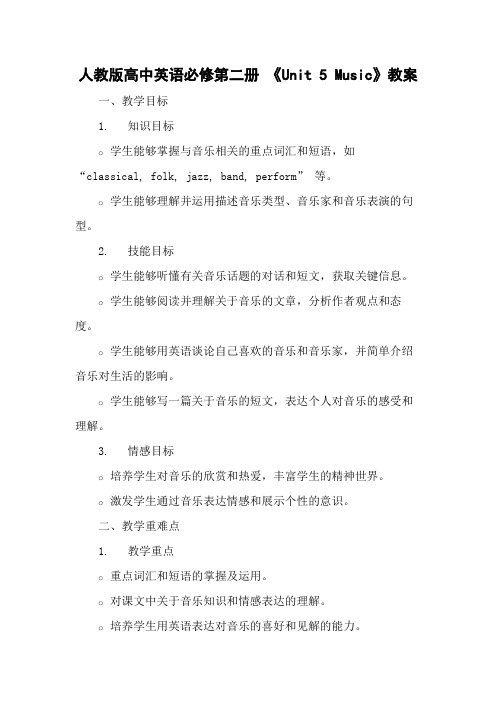
人教版高中英语必修第二册 《Unit 5 Music》教案一、教学目标1.知识目标o学生能够掌握与音乐相关的重点词汇和短语,如 “classical, folk, jazz, band, perform” 等。
o学生能够理解并运用描述音乐类型、音乐家和音乐表演的句型。
2.技能目标o学生能够听懂有关音乐话题的对话和短文,获取关键信息。
o学生能够阅读并理解关于音乐的文章,分析作者观点和态度。
o学生能够用英语谈论自己喜欢的音乐和音乐家,并简单介绍音乐对生活的影响。
o学生能够写一篇关于音乐的短文,表达个人对音乐的感受和理解。
3.情感目标o培养学生对音乐的欣赏和热爱,丰富学生的精神世界。
o激发学生通过音乐表达情感和展示个性的意识。
二、教学重难点1.教学重点o重点词汇和短语的掌握及运用。
o对课文中关于音乐知识和情感表达的理解。
o培养学生用英语表达对音乐的喜好和见解的能力。
2.教学难点o如何帮助学生准确运用丰富的词汇和句型描述音乐。
o引导学生深入理解音乐的内涵和价值。
三、教学方法1.视听教学法:通过播放音乐、视频等让学生直观感受音乐的魅力。
2.讨论交流法:组织学生讨论音乐相关话题,促进学生思维碰撞和语言表达。
3.情景创设法:创设音乐场景,让学生在情境中学习和运用语言。
四、教学过程(一)导入(5 分钟)1.播放一段不同类型的音乐片段,如古典音乐、流行音乐、摇滚音乐等。
2.提问学生:What kinds of music do you hear? How do they make you feel?(二)词汇教学(10 分钟)1.展示本单元的重点词汇和短语,结合音乐实例进行讲解。
2.开展词汇游戏,如音乐词汇猜猜猜,加强学生对词汇的记忆和理解。
(三)阅读前准备(5 分钟)1.让学生观察课文标题和图片,预测文章内容。
2.提出一些引导性问题,如:What do you think thepassage will be about music?(四)课文阅读(15 分钟)1.学生快速阅读课文,概括文章的主要内容。
新教材 人教版高中英语必修第二册 Unit 5 Music 学案(知识点考点提炼汇总及配套习题)
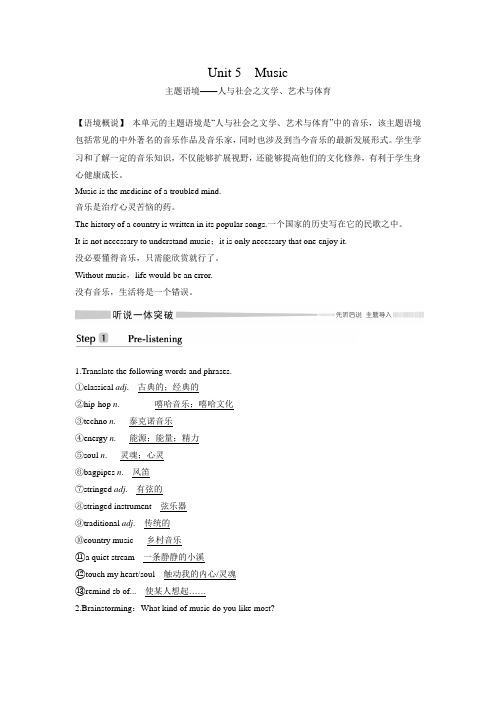
Unit 5Music主题语境——人与社会之文学、艺术与体育【语境概说】本单元的主题语境是“人与社会之文学、艺术与体育”中的音乐,该主题语境包括常见的中外著名的音乐作品及音乐家,同时也涉及到当今音乐的最新发展形式。
学生学习和了解一定的音乐知识,不仅能够扩展视野,还能够提高他们的文化修养,有利于学生身心健康成长。
Music is the medicine of a troubled mind.音乐是治疗心灵苦恼的药。
The history of a country is written in its popular songs.一个国家的历史写在它的民歌之中。
It is not necessary to understand music;it is only necessary that one enjoy it.没必要懂得音乐,只需能欣赏就行了。
Without music,life would be an error.没有音乐,生活将是一个错误。
1.Translate the following words and phrases.①classical adj.古典的;经典的②hip-hop n.嘻哈音乐;嘻哈文化③techno n. 泰克诺音乐④energy n. 能源;能量;精力⑤soul n. 灵魂;心灵⑥bagpipes n. 风笛⑦stringed adj. 有弦的⑧stringed instrument 弦乐器⑨traditional adj. 传统的⑩country music 乡村音乐⑪a quiet stream 一条静静的小溪⑫touch my heart/soul 触动我的内心/灵魂⑬remind sb of... 使某人想起……2.Brainstorming:What kind of music do you like most?classical__music,hip-hop,traditional__music,popular__music__and__so__on.3.Look at the pictures on Page 50 and tell your classmates what these people are doing. They__are__playing__music.4.Finish Ex.2 on Page 50.5.Try to translate the following sentences.①I__like__to__listen__to__hip-hop__music.我喜欢听嘻哈音乐。
人教版课标必修二 Unit 5 Music 学案

Unit 5 MusicWarming up1 Do you like music? How does music make you feel?你喜欢音乐吗?音乐让你感觉如何?2 Listen to the different kinds of music on the tape. Guest which music matches which picture.听不同种类的音乐磁带。
看你能否猜出哪种音乐跟哪幅图片相配。
3 What kind of music do you like: Chinese or Western, classical or modern? Why?你喜欢什么样的音乐:中国的还是西方的,古典的还是现代的?为什么?Pre-reading1 Do you know any famous bands? List some if you do.你知道一些著名的乐队吗?如果知道,列举出来。
2 Which one do you like best? Why?你最喜欢哪一个?为什么?3 Do you know anything about the Monkees? 你了解猴子乐队的有关情况吗?4 Look at the title and pictures in the reading passage. Can you predict what it is about? Then read it quickly and see if you were correct.看这篇文章的标题和图片。
你能预测这篇文章是谈什么的吗?然后快速阅读,看看你是否正确。
Reading课文学习THE BAND THAT WASN'T原来没有的乐队Have you ever wanted to be part of a band as a famous singer or musician? Have you ever dreamed of playing in front of thousands of people at a concert, at which everyone is clapping and appreciating your music? Do you sing karaoke and pretend you are a famous singer like Coco Li or Liu Huan? To be honest, a lot of people attach great importance to becoming rich and famous. But just how do people form a band?你想没想过作为著名歌手或音乐家成为乐队一员?你有没有梦想过音乐会上在成千上万人面前演奏,每个人都鼓掌并欣赏你的音乐?你唱过卡拉OK,把你装扮成像李玟或刘欢那样著名歌手?老实说,很多人认为成为富人和名人很重要。
人教版高中英语必修二unit5学案
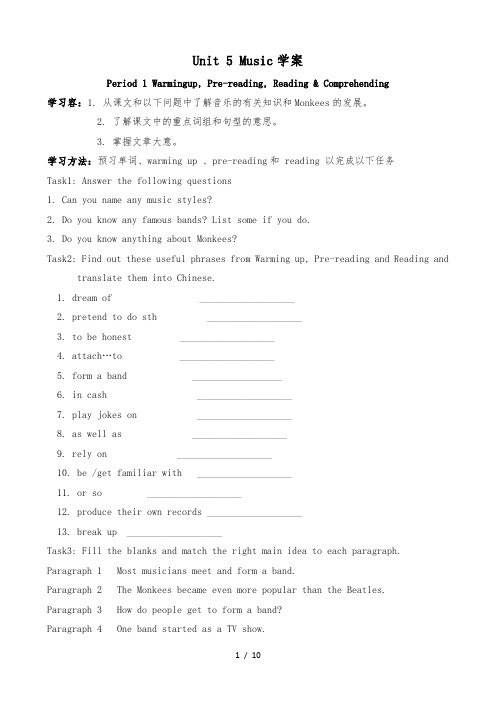
Unit 5 Music学案Period 1 Warmingup, Pre-reading, Reading & Comprehending学习容:1. 从课文和以下问题中了解音乐的有关知识和Monkees的发展。
2. 了解课文中的重点词组和句型的意思。
3. 掌握文章大意。
学习方法:预习单词、warming up 、pre-reading和 reading 以完成以下任务Task1: Answer the following questions1. Can you name any music styles?2. Do you know any famous bands? List some if you do.3. Do you know anything about Monkees?Task2: Find out these useful phrases from Warming up, Pre-reading and Reading and translate them into Chinese.1. dream of ___________________2. pretend to do sth ___________________3. to be honest ___________________4. attach…to ___________________5. form a band __________________6. in cash ___________________7. play jokes on ___________________8. as well as ___________________9. rely on ___________________10. be /get familiar with ___________________11. or so ___________________12. produce their own records ___________________13. break up ___________________Task3: Fill the blanks and match the right main idea to each paragraph. Paragraph 1 Most musicians meet and form a band.Paragraph 2 The Monkees became even more popular than the Beatles.Paragraph 3 How do people get to form a band?Paragraph 4 One band started as a TV show.Task4: Find out whether the following statements are true of false.1. Most musicians meet and form a band because they like to write and play music.2. The TV organizers had looked for five musicians who were lovely and who could makegood music.3. Each week the group that was called “The Beatles” would play a song or two writtenby other musician.4.“The Monkees” broke up in about 1960,but reunited in 1980Task5:How do people get to form a band? Fill in the formTask6 Read para3, 4 and draw a timeline for the experience of the Monkees Began————music and jokes————after a year or so————about 1970————in the mid-1980s————in 1996What happened to the band?Task7 ComprehendingQ: why was the Monkees called ”the Band That Wasn’t”?Q: what do you think of the Monkees?Homework1.作业本Part22.将下面这个问题写成一段小文章问题:你想成为明星吗?如果想,为什么,应该怎么做。
2019统编人教版高中英语必修第二册unit 5《Music》全单元教案教学设计
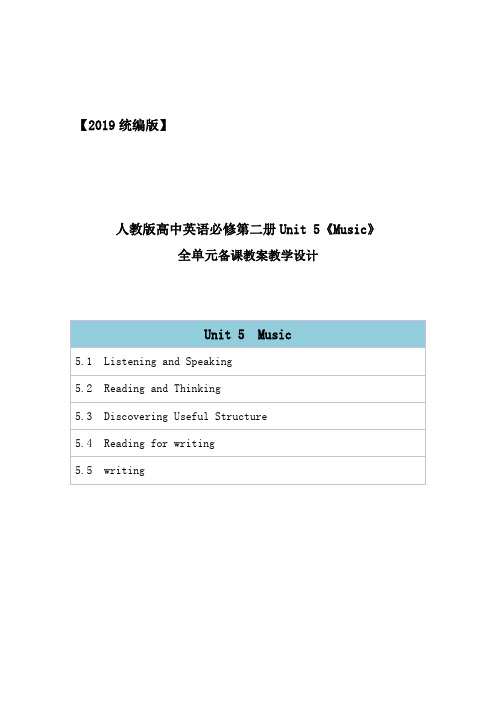
【2019统编版】人教版高中英语必修第二册Unit 5《Music》全单元备课教案教学设计Unit 5 MusicListening and Speaking【教学目标】1. Instruct students to get main facts by listening and motivate them to talk about the topics about music, the types of music, and how the music makes them feel.2. Develop students’ sense of cooperative learning and individual thinking capability.3. Develop students’ different listening skills to solve different listening comprehensive problems.4. Help students to understand how to use the structures “past participle as adverbial”.【教学重难点】Prompt students to talk about the related topics, such as types of music they know, their favourite type of music, how music makes them feel, and how to use past participle as adverbial.【教学过程】Step 1 Lead inThe teacher is advised to talk with their students about music.Boys and girls, before we listen, let’s work in pairs and discuss what type of music you know.Which type is your favorite? How does it make you feel? Share your ideas with partners.I know Chinese traditional music/classical music/country music/hip-hop/jazz/pop music/Latin music/rap/rock/punk…I like classical music. It makes me feel full of energy and happy.Step 2: PredictionAfter their small talk, the teacher can move on by finishing the following task: See the pictures and give the correct answers.1. What are the people doing in the picture below?2. Match the pictures with the correct types of music.A. Chinese traditionalB. classicalC. country musicD. hip-hop1_______________2_______________3_______________4_______________Step 3: Summary of the main ideaListeningI. Play the radio about The Sound of Music (音乐之声), and let students finish the following tasks.A star has come out to tell me1.___________________ to goBut deep in the dark-green shadowsAre voices that urge me to staySo I pause and I wait and I listenFor one more sound for one more lovely thing2.___________________ might say…The hills are alive with the sound of musicWith songs they have sung 3.__________________The hills fill my heart with the sound of musicMy heart 4.__________________ every song it hearsMy heart wants to beat like the wings of the birds that rise from the lake to the treesMy heart wants to sigh like the chime that flies from a church on a breezeTo laugh like a brook 5.__________________ and falls over stones in its wayTo sing through the night like a lark who is 6._____________I go to the hills when my heart is lonelyI know I will hear what I’ve heard beforeMy heart will 7.______________ the sound of musicAnd I’ll sing once moreII. The reporter paraphrased some of the answers the students gave him. Listen to the interviews again and complete the sentences with the words you hear.1. A: Country music touches my heart.B: So you like music that’s _______of _______?2. A: When I listen to hip-hop, I just have to move!B: So it makes you want to _______?3. A: Classical music makes me feel like I’m sitting beside a quiet stream and enjoying nature.B: So to you, it’s _______ and _______?Learning new wordsList the new words in the lesson, tell students the meaning of these words and give some examples.News words: classical, energy, soul…Talking projectGuide students to do speaking practice.I. Talk in pairs. Interview each other about music. Use the picture below for ideas.A: What kind of music do you like?B: I like techno music.A: What makes it so special to you?B: I like to listen to it when l exercise. It gives me energy.II. Work in pairs or groups and role play a conversation.●Suppose you are a reporter and interviewing the students who about music.➢I like to…➢Chinese traditional song/classical music/hip-hop music/country music…➢Listen to/play/sing…Unit 5 MusicReading and Thinking【教学目标】1. To acquire the basic usage of the new words and express concerning how computers and the Internet help us experience music.2. Enable students to understand the main information and text structure of the reading text.3. Enable students to understand past participle as adverbial.【教学重难点】1. Guide students to pay attention to reading strategies, such as prediction, self-questioning and scanning.2. To talk about the advantages and disadvantages of being a member of virtual choir.3. Lead students to understand past participle as adverbial;【教学过程】Step 1 PredictionAsk students the question.How can computers and the Internet help us experience music differently?Step 2: Learning new wordsLearn words:perform,enable,prove,award,and fall in love with…New words practiceIn order to have a good _______________ (perform), I have made good preparations for it.At present, developing the ___________ (able) of the students is an important task in our daily teaching activity.Step 3: Learning sentence patternsIntroduce the sentence patterns in the lesson and give some examples and explanation1. as 引导定语从句,意为“正如,正像”2. 过去分词(短语)作状语as引导定语从句的常用句式有:as is known to all 众所周知as we all know我们都知道as we can see正如我们所看到的as is reported正如报道的as is often the case这是常有的事as is mentioned above如上所述Step 4: Fast reading tasksGuide student to read the article quickly, teach some reading skills and do some exercises.Task of the first fast reading:Read quickly and figure out the key words of each paragraph.•Paragraph 1: enable•Paragraph 2: award•Paragraph 3: performanceTask of the second fast reading:1. What is mainly discussed in this passage?2. Which paragraph mentions background information about the virtual choir?3. Which paragraph mentions the conclusion of the virtual choir?Step 5: Careful reading tasksGuide student to read the article carefully and do some exercises.1. What is the attitude towards the virtual choir?2. Why does the virtual choir prove to be a good influence on the lives of many people?3. If you want to take part in a virtual choir, you need….Step 6: Study reading tasksAnalyze two difficult sentences in the text.1. Imagine having the opportunity to sing together with hundreds of other people while you are at home alone.2. A virtual choir enables them to add their voices to those of other individuals and become part of the global community.Step 7 Homework:Review what we have learned and find out the key language points in the text.Unit 5 MusicDiscovering Useful Structure【教学目标】1. Get students to have a good understanding the basic usage of past word segmentation as past segmentation as predicative and adverbial.2. Strengthen students’ great interest in grammar learning.3. Instruct students to express their ideas with this grammar correctly.【教学重难点】How to enable students to use the structure and meaning of past word segmentation as past segmentation as predicative and adverbial.【教学过程】Step 1 Lead-inGive some messages and ask students to guess who she is.英语过去分词的句子。
- 1、下载文档前请自行甄别文档内容的完整性,平台不提供额外的编辑、内容补充、找答案等附加服务。
- 2、"仅部分预览"的文档,不可在线预览部分如存在完整性等问题,可反馈申请退款(可完整预览的文档不适用该条件!)。
- 3、如文档侵犯您的权益,请联系客服反馈,我们会尽快为您处理(人工客服工作时间:9:00-18:30)。
Unit 5 Music第一课时Warming up ﹠vocabulary预习导学本单元重点单词,请写出下列单词的汉语意思:1.classical ________2.folk_______3.jazz______4. musician______5.pretend_______6.attach______7.form_______8.passer-by ______9.earn_______ 10.extra______ 11.instrument___ 12.perform______13.performance ___ 14.pub_______ 15.cash_______ 16.studio_______lionaire______ 18.actor______ 19.rely_______ 20.broadcast_____21.humorous______ 22.familiar_____ 23.attractive____ 24.addition______25.dip_______ 26.confident___ 27.brief _______ 28.briefly ____29.devotion _______ 30.afterwards__ 31.invitation____ 32.beard_______33.sensitive_______ 34.painful_____本单元重点词组,请写出下列单词的汉语意思:1.dream of _______2.to be honest____3.attach…to_______4.in cash ____5.play jokes on____6.rely on_______7.be/get familiar with _______8.above all _______ 9.stick to_______ 10.or so ____ 11.break up_____12.by chance _____ 13.in addition_____ 14.sort out_______实战演练一、词汇学习1.古典英语______2. 摇滚乐_________3. 说唱_________4. 爵士乐_____5. 民乐________6.乡村音乐________7. 交响乐_________8.合唱________9. 蓝调_________ 10嘻哈音乐_______ 11. 流行音乐______ 12.西方音乐______13. 轻音乐_______ 14. 乐队_________ 15. 音乐家________二、根据首字母填写单词1. The ball r ______ down the hill.2. A_____ the stamp to the front of your letter.3. Many fans were once impressed by Jay’s wonderful p________.4. As babies, we r______ entirely on others for food.5. I’m very sorry. To answer this question is beyond my a________.6. He’s a f_____ figure in the neighborhood.7. As far as I know, Miss Gao enjoys listening to f______ music very much.8. His d_______ to his wife and family is touching.9. They s______ all that they had when they were abroad.10. You are far too s______ about her words.第二课时Reading预习导学一、根据课文的内容填空If we are_____ _______ourselves, most of us have_______ ______ being famous sometimes in our lives. Most musicians often meet and ________ a band .Sometimes they play in the street to _______so that they can earn some _______ money and this also gives them a _____ to realize their dreams. There was once a band started in a different way .The musicians of whom the band was formed ________ ______ ______eachother as well as played music. whose music and jokes were loosely _______ _____“The Beatles”. Their exciting performances were copied by other groups. “The Monkees” played their own ______ and wrote their own music. Though it ________ ________ in 1970, it reunited in the mid-1980s and it is still popular today.实战演练一、单词填空1. If you __________(坚持)to the truth, you have nothing to fear.2.I’m told that she is an _______(有吸引力的)girl.3.If you want to sell your sofa, why not put an _____________(广告)in the local newspaper?4.The group of popular singers will give another two p__________(演出) before leaving China.5.Police asked some p__________(过路人) to get some evidence about the accident that happened just now.6.They played to passers-by in the street so that they can e________ some e______ money.7. If we are h________ with ourselves, most of us have dreamed of being famous.8. After some years, he has f_______ the habit of having a walk after supper.9. They put an advertisement in a newspaper looking for m__________(乐师).10.He had to go to London, wear an expensive suit and give a p___________ to a TV camera.二、短语翻译1.梦见,梦想_____________2.假装… ______________3.说老实话,老实告诉你______________4.认为…有(重要性、意义)___________5.组建一支乐队________________________6.用现金支付__________________________7.表演________________________________8.戏弄某人____________________________9. 以及,又,也_______________________10.在报纸上刊登广告___________________11.依靠,依赖_________________________12. 对…熟悉_________________________13.大约_____________14. 打碎,分裂;解体;(关系)破裂_________________15. 受…欢迎__________________________反馈检测一、单项选择1.---How did you get to know all about the accident?---_____.A. By myselfB. By the chanceC. By mistakeD. By accident2. I don’t know the result _____, but _____, I don’t think our team won an advantage over theirs in yesterday competition.A. for sure, honestly speakingB. of sure, to be honest with youC. for certain, honestly spokenD. certainly, to be honest to you3. He is always serious and doesn’t like _____.A. play jokesB. being played jokes onC. being played jokesD. to play joke on others4. I do every single bit of housework _____ my husband Bob just does the dishes now and then.A. sinceB. whileC. whenD. as5. Is this the school ________ you studied ten years ago?A. in whichB. thatC. in thatD. the one that6. Recently I bought an ancient Chinese vase, ________ was reasonable.A. which priceB. the price of whichC. its priceD. the price of whose7. People may have different opinions about Karen, but I admire her.________, she is a great musician.A. After allB. As a resultC. In other wordsD. As usual8. Henry knows little of physics _____ of chemistry.A. as well asB. and still lessC. and still moreD. no less than9. I didn’t like the way he looked at me.A. in whichB. thatC. 不填D. all the above10. There is no doubt he will succeed.A. whetherB. whichC. thatD. if11. We want to find a house, one which is modern, comfortable and _____ quiet in the neighborhood.A. after allB. in allC. above allD. all in all12. English is as a matter of fact very easy because a sentence can be _____into clauses.A. broken outB. broken upC. broken awayD. broken from13. You’d better solve this difficult problem _____ it is too late.A. beforeB. afterC. whenD. unless14. The man _____ this house belongs is a friend of Wang Lin’s.A. whomB. to whomC. for whomD. with whom15. She had three daughters altogether, two _____ are nurses.A. of theseB. of whomC. of whoseD. of them16. The book _______the life of the students is popular with the teenagers.A. which based on B . based on C. basing on D. being based on17. She pretended me when I passed.A. not to seeB. not seeingC. to not seeD. having not seen18. When Marry heard the terrible news, she ______completely.A. broke awayB. broke outC. broke downD. broke through19. She devotes herself _______________ , and makes it her life.A. to teachB. to teachingC. teachD. teaching20. ---It’s too noisy. What is happening?---Two men are fighting. Let’s go and break them _________.A. downB. upC. outD. in第三课时Grammar预习导学语法专题:定语从句中介词+ 关系代词当我们在用带有介词的定语从句时,我们有两种选择,介词放在关系代词前或者是放在定语从句中。
